What CMS Is Best for Your Next Website? Comparison of Popular CMSs: WordPress vs OpenCart vs October CMS
There are lots of content management systems (CMSs) you can build your website with, and each has its pros and cons. If you’re thinking about creating your own website, this article may help you choose the best CMS for your goals and hire website developers that have needed skills
Most modern websites are based on a content management system. Content management systems have become extremely popular in the last 10 years, as developing a website with them is fast and easy, and a CMS makes it convenient to manage a website in production.
Many businesses choose to use a CMS for their website because it saves money: you’ll still need a developer, but a CMS cuts down the development time significantly compared to using a framework.
The global CMS market share will reach $ 123.5 billion by 2026 (Source: Zion Market Research). Its size was $ 35.9 billion in 2018. The market is expected to grow at a CAGR of 16.7%.
In this article I won’t be telling you which the best ecommerce CMS platform is: but I’ll give you an idea of which CMS to choose for your particular goals.
Before we jump into choosing the right CMS for you, let’s look at the general options you have when you want to create a website.
I want to develop a website. What options do I have?
The only option we won’t be reviewing here is building your website with pure code completely from scratch because no one does that nowadays: it’s too time-consuming and actually has no benefits, as you’ll always need a developer’s support if you want to change even the smallest thing on your site. Moreover, there are so many ready solutions you can easily integrate into your website that building everything from scratch is unnecessary.
Frameworks
Each web programming language has its own framework or frameworks. For example, PHP has Symfony and Laravel, and Java offers Spring and over 10 other popular frameworks to choose from.
Frameworks are codebases with lots of ready solutions that are easily customizable. A good framework also has a community that helps developers integrate complex solutions into their websites. Often, frameworks are open source, so people contribute their own modules that help others develop their websites fast.
If you develop your website with a framework, you’ll need constant developer support — unless, of course, your developer creates an admin panel. Often, frameworks have ready admin panels your developer can customize for your needs.
CMS
A content management system provides a preconfigured website that you can change according to your needs with the help of modules, templates, and plugins. A CMS allows for customization with code but has its limitations.
The best thing about a CMS is that it allows you to build a website rather quickly and also helps to save on development costs. For this speed, you’ll need to sacrifice flexibility, however, as all modules and elements are premade and hard to customize.
Many businesses end up creating their own templates for CMSs so they can fully meet their goals. Still, developing with a CMS is much faster than developing with any other method, and an advanced CMS allows you to integrate nearly any functionality your business might need.
No-code platforms
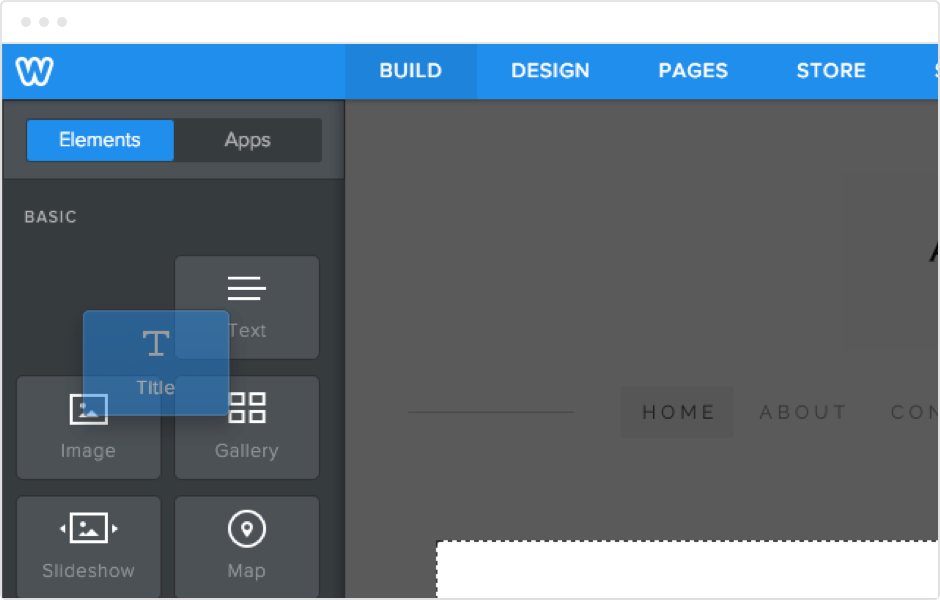
Another option is a no-code platform, which is very similar to a CMS. However, the selling point of a no-code platform is not needing a developer at all. Such platforms are often hard or impossible to customize, but they’re great if you need a small landing page or a business website without any advanced functionality.
No-code platforms will charge you a monthly fee for using them, so make sure you consider it in your budget.
In this article, we’ll be talking about building websites with certain CMSs and will discuss their pros and cons. Let’s start with a quick overview of the three most popular CMSs most websites are based on.
WordPress
WordPress is a top CMS in terms of worldwide popularity, with around 30% of all websites operating on it. WordPress websites are easy to set up, control, and customize, and that’s why WordPress is the primary choice for most businesses.
In general, WordPress is the go-to option for landing pages, blogs, and business websites. WordPress developers are constantly supporting and updating the system, so it’s rather secure and convenient.
Here are the recommended requirements for running WordPress on your server:
- PHP version 7.3+
- MySQL version 5.6+ or MariaDB version 10.1+
- HTTPS support
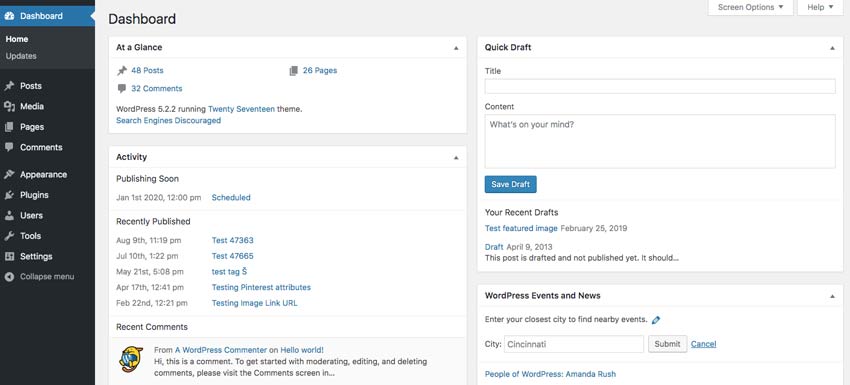
Note that WordPress also works with PHP 5.6+ and MySql 5.0+, but these versions are already outdated, so I wouldn’t recommend using them, as doing so can make your website vulnerable to hacker attacks.
OpenCart
OpenCart is another popular CMS that specializes in ecommerce and helps you create online stores. It’s the best CMS in the ecommerce niche, as it offers everything an online store needs:
- Product listings
- Search
- Checkout and cart
- Payment gateway
If you need to create an online shop, OpenCart is one of the best ecommerce CMS solutions, that will help you get the job done quickly and with minimal effort. This CMS isn’t really suitable for anything else other than online shops, though. It’s not as frequently updated as WordPress, but it’s still rather secure.
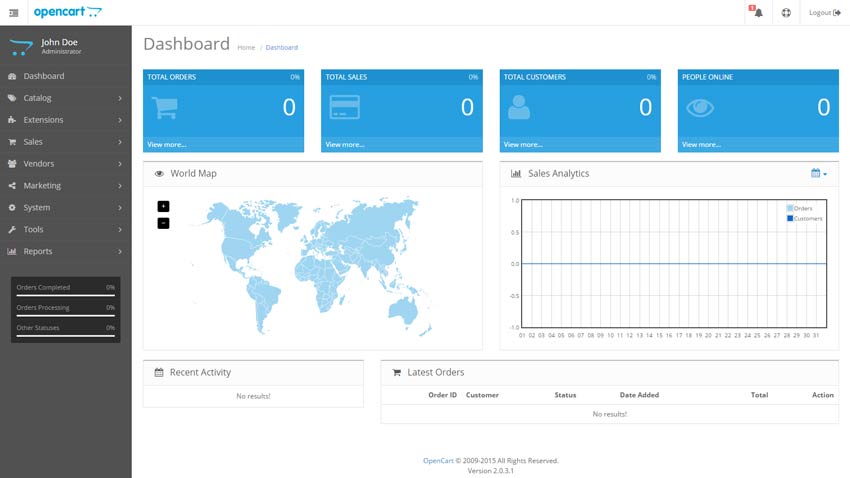
Note that if you already have a website based on OpenCart version 1.5 and you need to update it to version 3, you’ll need to fully move your website to a new platform. This means you won’t be able to get away with a mere update.
These are the recommended requirements for running OpenCart:
- Web server (Apache suggested)
- PHP 5.4+
- Database (MySQLi suggested)
Here are the PHP modules and libraries you’ll need to run a website on OpenCart:
- cURL is a PHP library and command line tool (like wget) that helps you upload files as well as data over HTTP and FTP. It supports proxy servers, you can transfer data over SSL connections, you can set cookies and even receive files that are behind the login.
- ZIP module makes it easy to read and write to both the lock ZIP archives themselves and the files inside them.
- Zlib module allows you to transparently read and write compressed gzip (.gz) files using most of the filesystem functions that work with compressed gzip files (and no sockets).
- GD Library is a graphics library for dynamic image management software. Its native programming language is ANSI C, but it has interfaces to many other programming languages. It can create GIF, JPEG, PNG and WBMP files.
- Mbstring stands for multibyte string functions. Mbstring is a php extension used to manage non-ASCII strings. Mbstring is used to convert strings to different encodings.
- XML stands for Extensible Markup Language. XML is used to structure, store and transfer data from one system to another.
October CMS
October CMS is the youngest content management system on our list, but it’s managed to become a favorite among many developers. October CMS is based on Laravel, and this is what developers love about it. Because Laravel has so many capabilities, developers can use October CMS to meet a client’s (almost) every wish.
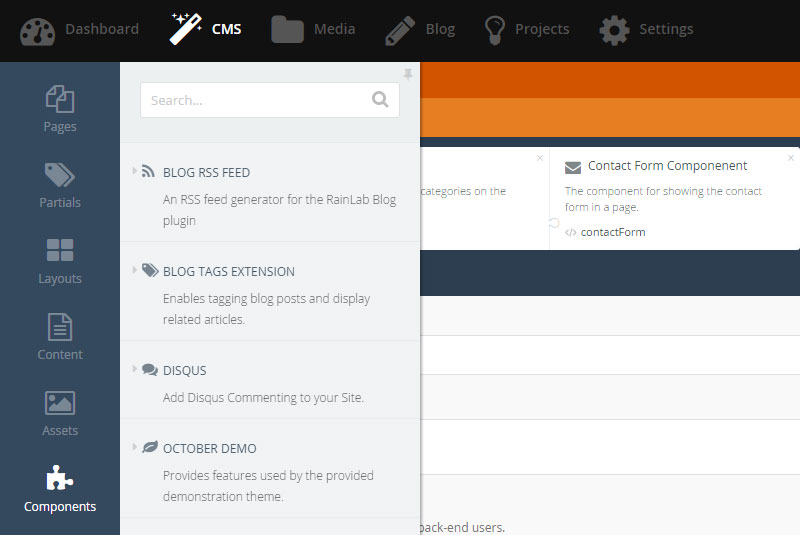
Here are the main requirements for a server to run October CMS:
- PHP version 7.0.8 or higher
- PDO PHP extension
- cURL PHP extension
- OpenSSL PHP extension
- Mbstring PHP library
- ZipArchive PHP library
- GD PHP library
Because October CMS is based on Laravel, it’s flexible and can be used for almost any type of website. The downside to this flexibility is that the development costs are high: developers need to perform more actions to choose the best possible solution for your exact business and goals.
October CMS provides rather frequent updates for both the system itself and for plugins and modules.
Which CMS best suits your needs?
There are lots of types of websites, including:
- landing pages
- business websites
- enterprise websites
- ecommerce websites
- blogs
- portfolio websites
- social media websites
- media websites
- educational websites
- nonprofit websites
Because there are so many different types of websites, CMSs often target one or several niches. When you’re trying to find out how to choose the best CMS, you should consider your business goals first. Let’s discuss which CMS is best for different types of websites.
WordPress
Initially, WordPress was designed to create landing pages and blogs. For this, it has functions and plugins such as Yoast SEO, ACF, Contact Form 7, and Super Cache. These tools allow users to quickly launch a fully fledged website.
However, WordPress is currently much more versatile: for example, its WooCommerce plugin allows you to create ecommerce websites. Its functionality allows for listing management and order placement, payments, and lots of other things.
WordPress is great for small to medium-sized websites like blogs, business websites, landing pages and so on. However, you can use WordPress for literally anything thanks to thousands of plugins
The advantage of WooCommerce is also its downside, however. Because WooCommerce is so big, being essentially a subsystem, its structure is complicated. This can extend the development time for an ecommerce website, as WooCommerce can often be quite confusing for developers.
I wouldn’t recommend WordPress for an ecommerce website: it’s better to choose another CMS that was created solely for that purpose.
However, WordPress is great for creating landing pages and business websites. If you need a small or medium-sized website, WordPress will cover all your needs.
OpenCart
OpenCart is a highly specialized CMS for online shops, and I can say with confidence that it’s the best CMS for ecommerce 2020. It has all the necessary ecommerce functionality, including product listings that can be customized and enhanced with the help of various plugins and a shopping cart with everything you need, from promo codes to discount logic.
If OpenCart’s off-the-shelf functionality isn’t enough and you need something beyond that, a large community has already created lots of plugins that cover almost anything, from different sliders to gifts and category trees.
I recommend OpenCart to any client that wants to build an online store. The only downside is a great difference between OpenCart versions
The only thing that can cause a problem is moving between OpenCart versions. Versions 1.5, 2.3, and 3.1 aren’t just different versions of this system: they’re basically different CMSs. So if you want to update your website from 2.3 to 3.1, you’ll need to move to a whole new system. Your developer will also need to consider the OpenCart version when looking for plugins, as they’re usually made for specific OpenCart versions.
Also, there’s no point using Opencart for anything other than an ecommerce site, as you’ll end up with lots of functionality you never use.
October CMS
October CMS is the most neutral platform on our list. You can build most any type of website with it, from landing pages and business websites to ecommerce and enterprise web solutions.
October CMS requires a more skilled developer, but in return it allows more customization and an ability to build a large and more complex solution
In my opinion, however, October CMS is harder to get started with and requires more advanced programming skills than WordPress or OpenCart. October CMS offers off-the-shelf templates and themes, but they’re rarely enough. In my experience, not one client has left an October CMS template as is, because ready solutions rarely meet all of a client’s business needs.
You’ll likely need to change something in your October CMS-based website, and for this you’ll just need to hire a skilled developer.
CMS comparison
Let’s now have a final CMS features comparison of these three content management systems according to development speed and the availability of plugins and modules.
Development speed
This is one of the most important criteria that influences your choice of CMS. Development speed is affected by the convenience of the API, system adjustments in the admin panel, and the logic of content management.
Creating a custom theme
To create a custom WordPress theme, a developer needs minimal skills. The most important thing is to integrate all scripts correctly and use appropriate template files. There’s lots of documentation on how to work with the WordPress API, so there shouldn’t be any problems with that.
OpenCart requires slightly more skill, as it uses an MVC architecture. Your developer should understand what a model, view, and controller are. If a developer is familiar with this architectural pattern, developing on OpenCart shouldn’t take much time.
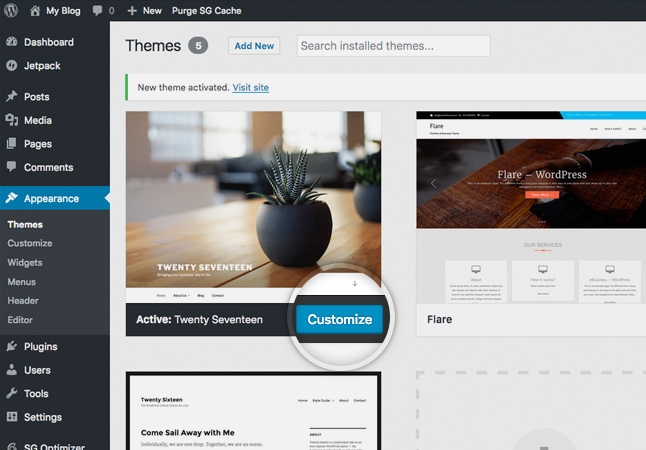
October CMS is probably the most challenging CMS to create custom themes for, as it requires more advanced programming skills, in particular an understanding of object-oriented programming. And because October CMS is based on Laravel, developers can face challenges when integrating functionality. With that said, October is more flexible and allows for more advanced functionality.
Speed of integrating an off-the-shelf theme
When it comes to integrating a ready theme, these CMSs are equal. The only thing you should keep in mind is that buying an off-the-shelf theme doesn’t mean you instantly get a working website. You’ll need to spend time to set it up, adjust it for your needs, remove everything you don’t need, and add the functionality you do. This is why it’s sometimes more rational to create your own custom theme instead of trying to adjust an existing one.
Availability of plugins and modules
Plugins for online stores
The clear winner here is OpenCart, as it has plugins for everything an online store can possibly need. WordPress has a WooCommerce plugin that I’ve found inconvenient and too complex, though it also has lots of additional plugins for everything from shopping carts to delivery management functionality.
When it comes to plugins for online stores, OpenCart is the most advanced CMS, however, WordPress also has a bunch of useful plugins for ecommerce websites
October CMS isn’t as advanced in this respect as WordPress or OpenCart, but you can still create an online store with it.
Plugins for dynamic website elements
Dynamic website elements include different sliders, top products, call-back forms, and other elements. WordPress is a leader in this respect.
OpenCart also has lots of plugins for these elements, but it depends on what requirements you have for the plugin.
October CMS has fewer such plugins, as they’re usually developed according to the client’s needs.
Here’s a CMS comparison table (ranking from 1 to 5 points, where 1 – bad, 5 – great):
| WordPress | Opencart | October CMS | |
| Speed of creating a custom theme | 5 | 4 | 3 |
| Speed of integrating a ready theme | 3 | 3 | 4 |
| Availability of ecommerce plugins | 4 | 5 | 3 |
| Availability of plugins for dynamic elements | 5 | 4 | 4 |
This CMS comparison should make it easier for you to choose the best CMS to build a website for your business.
Final thoughts
Choosing a CMS is an important decision that you need to make before you begin development and with your future plans in mind. WordPress is the best CMS for blog websites or landing pages. If you need a small or a medium-sized website without any complex functionality, WordPress is a great option.
Which CMS is best for ecommerce? I recommend choosing OpenCart. October CMS is a great solution for a more advanced enterprise product that needs more customization and complex functionality.
At Mobindustry, we create websites of any level of complexity, and we can base your web solution on any CMS. If you need a website, make sure to contact us. We’ll help you with choosing a CMS for your business needs.


